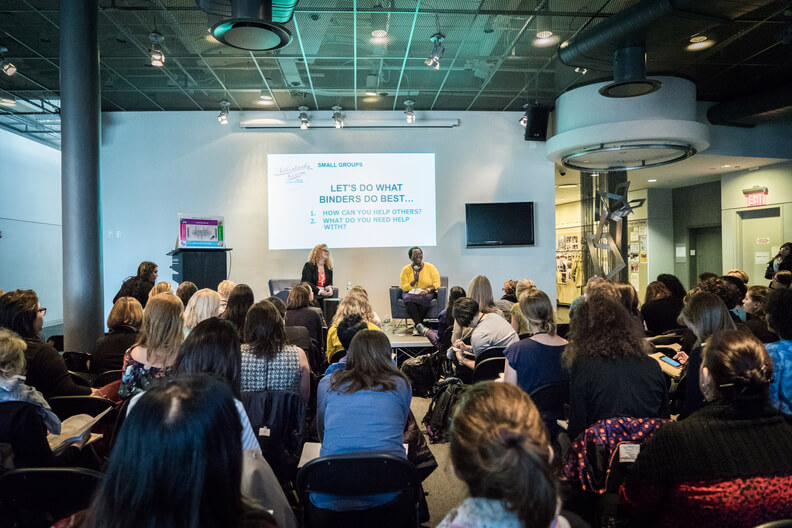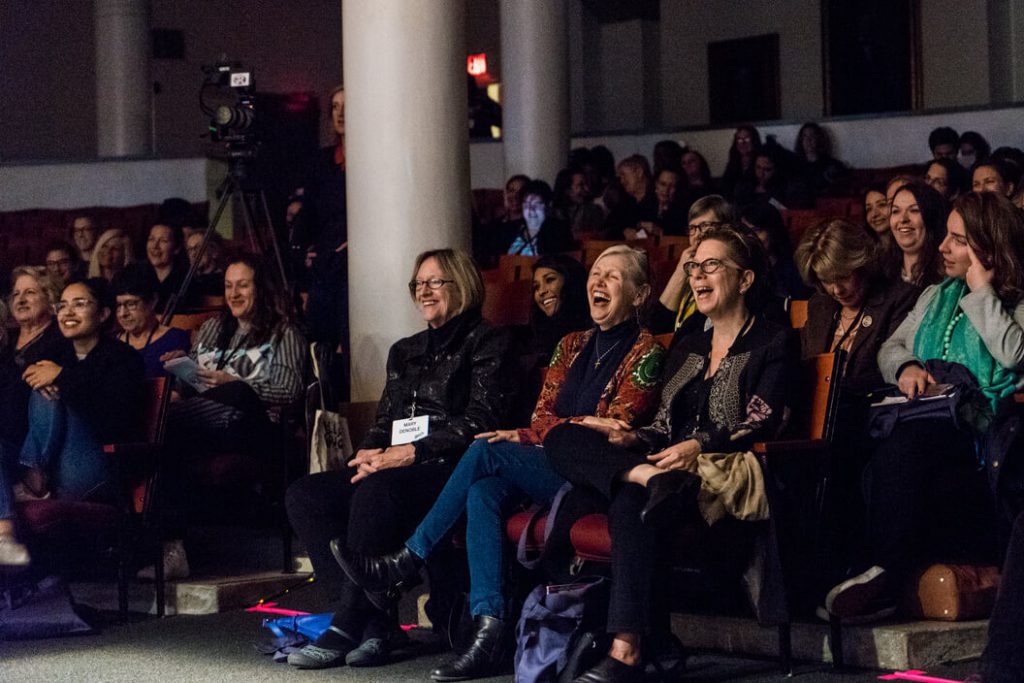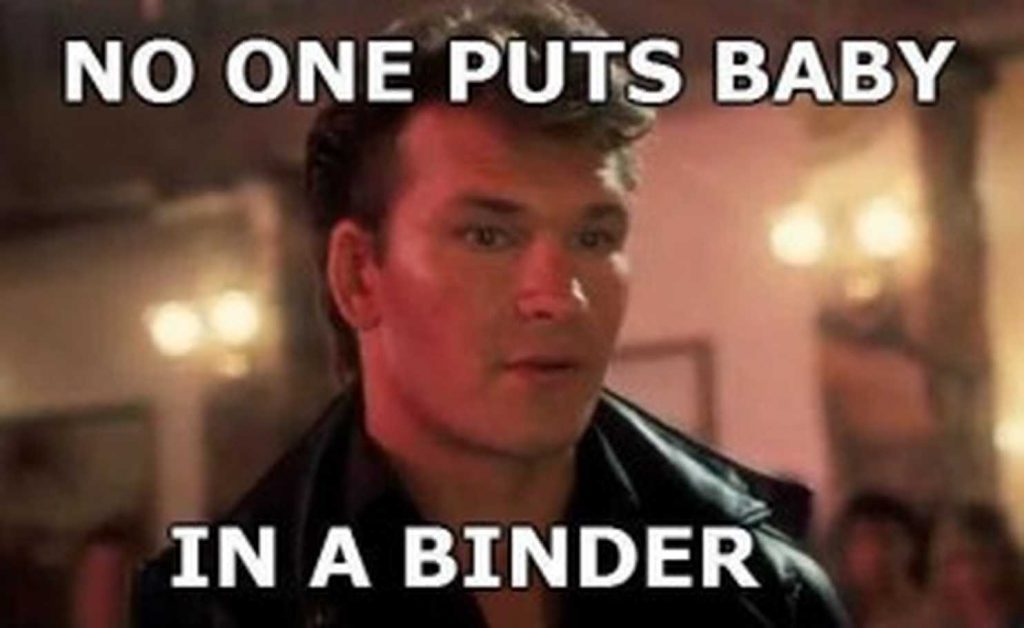Binders Full of Babies: The Cost—and Value—of Accessibility at Feminist Writing Conference BinderCon
Leigh Stein remembers 2014 well. Sometime in the summer, she had joined a private Facebook group for women writers, and she was mesmerized. It didn’t matter that she was about to go on vacation in Budapest; she brought her laptop with her for the sole reason of keeping up with the group. “I felt like a teenager again, forming intimate alliances with women I’d never met, typing little messages of courage and hope and sympathy at all hours of the day and night,” she writes in her memoir Land of Enchantment, which was published this August. The day after she returned home in July, she posted to the group, asking “What if we had a conference?” Leigh’s ambitions didn’t account for what BinderCon would become. “At the time I was working at a non-profit teaching theater to children in Brooklyn, and the organization had a black box theater that could fit 70 people. I thought we could all just meet up there,” she told me by phone earlier this month.
It’s funny to think of while sitting with 550 attendees in Cooper Union’s Great Hall, the same room where, nearly 100 years ago, the victory of New York State’s “Votes for Women” referendum was celebrated; where Abraham Lincoln gave a historic speech calling for the end of slavery; where the NAACP was born.
***
I remember where I was when I received an invitation on Facebook to join the private group that would eventually spin off into the real life BinderCon. While the Facebook group name remains private, the name of the conference points to the inspiration: in 2012, during the second “town hall” style debate of the election season, Mitt Romney said he had “binders full of women” to consider for cabinet positions.
It was also in the summer of 2014, and I was working as an “e-commerce customer support specialist,” which is a fancy way of saying I sat in a windowless room talking on the phone with disgruntled customers. It wasn’t where I envisioned myself a year out of college: I majored in literature and wanted to write. But aside from some small unpaid pieces online, I wasn’t going anywhere.
Maybe this is why I remember the invitation so clearly—someone I knew on Facebook thought I was good enough to add to a private group largely concerned with writing. I mostly observed: reading posts and comments, and following other writers on Twitter. I snuck glances at my phone during my job, and it was there that I saw Leigh Stein’s post about starting a conference.
Lux Alpatraum saw it too. She had recently sold her website Fleshbot, a blog on the adult entertainment industry, and was looking for a new opportunity. “I was interested, but a little anxious,” she explained to me over the phone in September. “A lot of times people say they want to do things and not only do they understand how hard it’s going to be, but they are actively against taking the steps that they need to take.”
The first person to post a thread in the newly formed Google Group dedicated to the yet-to-be-named-conference, Lux asked the hard questions. If the conference was going to happen, there needed to be money; for there to be money, there needed to be sponsors. Shortly after, Lux was asked by Leigh to be her co-chair.
A Kickstarter began, money was raised, sponsors were found, and the first conference happened on the campuses of New York University and Cooper Union in fall 2014. The nonprofit Out of the Binders was formed, and plans began for the Los Angeles conference, which aimed to focus more on screenwriting.
But the price tag of $80,000 per conference, an expense that has remained consistent for each subsequent year, is high for a nonprofit that is largely run by volunteers. The initial Kickstarter set out to raise $40,000, pulling in $55,393; additional money came from sponsors such as the Harnisch Foundation and Mailchimp. Lux did not shy away from mentioning that Out of the Binders is still trying to raise enough money to pay Leigh a salary so she can commit to the organization full time.
“If she were able to do it full time, we’d be able to do even more amazing things,” Lux explained.
“People don’t understand how difficult it is to get funding for conferences,” she continued. “Foundations won’t pay for operating costs a lot of the times, which makes it difficult to pay staff.
“You can’t have the programming if you don’t have the people doing the programming.”
In it’s second year, and at its fifth conference, Out of the Binders, and especially its finances, were thrown into the spotlight as issues of childcare and accessibility were raised—a conversation that at times threatened to overshadow the event itself.
***


When freelance writer Britni de le Cretaz was asked to be part of a panel earlier this year, she said yes. She was pregnant, but at the time the thought that an infant would not be allowed “didn’t even cross her mind,” Britni explained to me on Saturday. We sat outside the Great Hall while a friend watched her baby. Since she began freelance writing after her first pregnancy, Britni has accumulated an impressive number of bylines in the past year and half: she’s written for Rolling Stone, The Atlantic, and The Guardian, to name a few. For her, attending BinderCon presented an important opportunity to continue advancing her career and further engage her online community IRL.
Upon the panel’s acceptance—coincidentally enough titled “Body Politics: Writing Reproductive Rights and Justice During the War on Women”—she emailed the conference organizers to request accommodations for herself and her infant. Emails were exchanged, and conference organizers emphasized the event’s 18+ policy. Instead, a childcare stipend of $250 was offered.
BinderCon’s ticket sales page states, “Please note that, as a professional development conference, BinderCon attendance is limited to those above the age of eighteen (21 for events where alcohol is available). If you require childcare assistance, please contact the organizers for information about our childcare stipends.” But as BinderCon champions inclusivity, with measures such as including preferred pronouns on name badges to fine-tuning the website to be more accessible for visually-impaired users to including a glossary of definitions for terms ranging from feminism to columbusing to microaggressions, the assumption that BinderCon could potentially accommodate a weeks-old infant isn’t unwarranted.
While Britni made a point of not publicly discussing the issue, except to ask on her personal page for help watching her infant during the conference, other BinderCon attendees began tweeting the night before the conference to highlight her situation, using the conference hashtag. When searching #BinderCon on Twitter, the first trending tweet that appears concerns Britni’s situation.
On Saturday, October 29th—the issue now public knowledge—Jenny Lumet, screenwriter and member of Out of the Binders’ board of directors, announced, before the Q&A portion of the panel that Britni presented on, that a moderated discussion would be held on the topic the following morning. Minutes before, Britni had noted that while the 18+ policy was inconvenient for her, it could be devastating for others without the proper resources.
When Britni asked Jenny—on stage—whether she could bring her infant to the 9:30 AM discussion on Sunday, October 30th, she was met with a simple, “Probably not.”
I spoke with Britni after her panel. She was frustrated by how the conference was handling the issue.
“I’m disappointed. I wish they had taken the feedback or even said they were working on it,” Britni told me, referring to the emails she had sent in the months beforehand. “You know, they can bring up their financial thing, but letting me bring my nursing infant costs nothing, literally nothing.”
***


The next morning, I arrived a few minutes early to the moderated discussion. Leigh, Lux, and Jenny were there, among a group of about twenty. By the end of the discussion, the crowd had doubled. Discussion notes—with names of speaking attendees left anonymous—were made available later in the day.
The financial component wasn’t the only point of discussion, but it was a central one. Some numbers: each BinderCon costs $80,000 to put together; childcare for 12 children over the course of a two day conference costs $5,000; there are approximately 550 attendees at each conference.
See how this gets complicated? While $5,000 may not sound that large when compared to the total cost of the conference, it only covers 12 children. The expenses only rise from there.
But we’re discussing nursing parents, one attendee noted. Jennie Baird, who acted as moderator and sits on Out of the Binders’ Board of Advisors, noted that not all nursing parents define a nursing child the same way. For some, the child is a six-week old infant; for others, the child is a two-year-old. As Jenny Lumet later noted, she wants to be mindful of “parsing parents’ decisions.”
No conference can purport to make these distinctions for parents. And it’s tough. It was tough to listen to, even as a non-parent, as attendees explained how a policy allowing for nursing parents would be triggering and hurtful since they themselves were unable to nurse their children. It was important to listen to the attendee who noted that because she is hard of hearing that attending a conference with children would impede her experience.
And despite the united front Out of the Binders presents, Leigh noted that any time the issue of childcare or nursing parents has come up, she has asked the organizing committee to revisit. There hasn’t been agreement, but the consensus has remained the same.
***


It isn’t the first time BinderCon has dealt with the issue. Earlier this year, Jade Sanchez-Ventura wrote in Mutha Magazine that the policy effectively prevented her from attending the 2015 BinderCon in New York. “I wanted to be welcomed as I am, a mother and a writer able to participate in her own field,” Sanchez-Ventura wrote. BinderCon issued a response. On behalf of the organization, Lux wrote, “For our most recent conference, we looked into the possibility of providing on-site childcare; regrettably, the quotes we received were far outside our budget, and required much more space than our venue could provide us with.”
“As a conference focused on women writers, driven by a feminist mission, we are held to a much higher standard than other conferences, even as we work within an incredibly limited budget,” she continued.
This may be true, but it serves to highlight the difficult nature of claiming a feminist mission. There are financial considerations and bottom lines to consider. And as both Britni and Lux noted to me—in separate conversations, each using their term of choice—we live in a patriarchal and sexist society
And yet if a contingent of attendees (especially those who are active members of the community) are asking for accommodations, their voices need to be heard and heeded. Yes, Out of the Binders is young, and yes, there may be limits on immediate actionability. But in order to truly grow, thrive, and fully embrace a feminist mission, organizers and policies must reach for more and not settle.
***
On Sunday afternoon, I briefly caught up with Lux. Was the backlash expected?
“We knew there was a possibility,” Lux replied. “But I’m really glad that people were passionate about BinderCon to feel that what we’re doing is valuable enough that it is worth being angry about our policy.”
It goes back to the idea of community that Britni praised when we spoke. Despite her experience, she applauded attendees who reached out and offered to help her.
“I had more people willing to watch my baby than I needed, which has been amazing,” she said. “People were willing to walk out of panels when I need childcare and make themselves available so that I could come. I wouldn’t be here if they didn’t.”
Photos courtesy of Max Kristula-Green
You might also like 




















